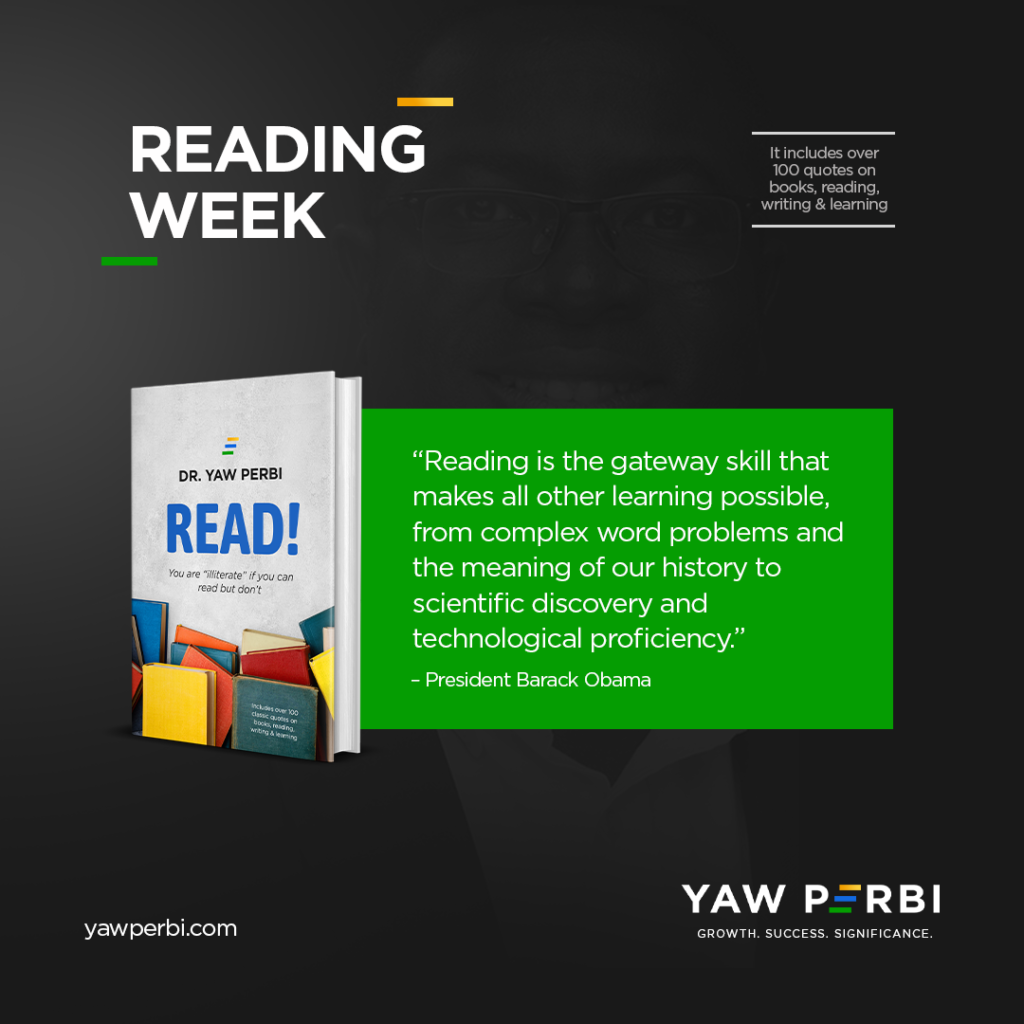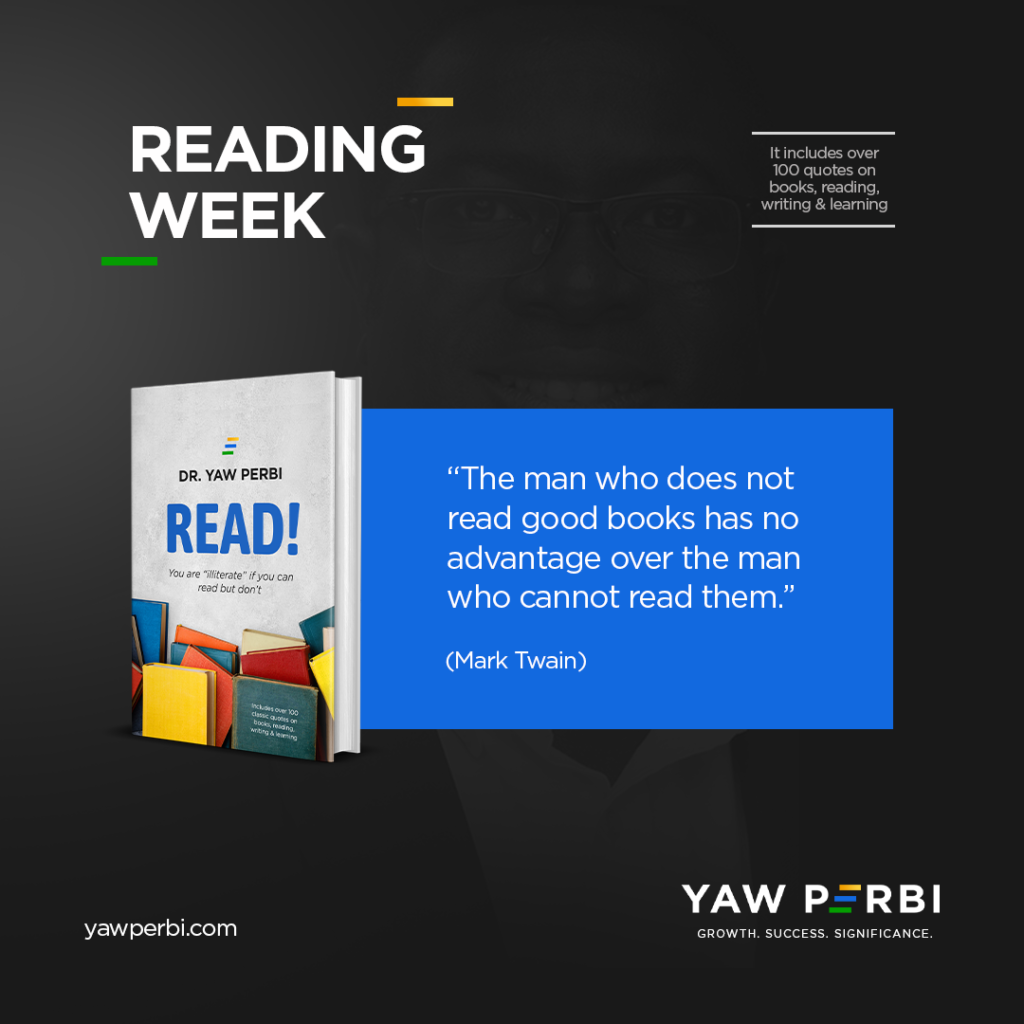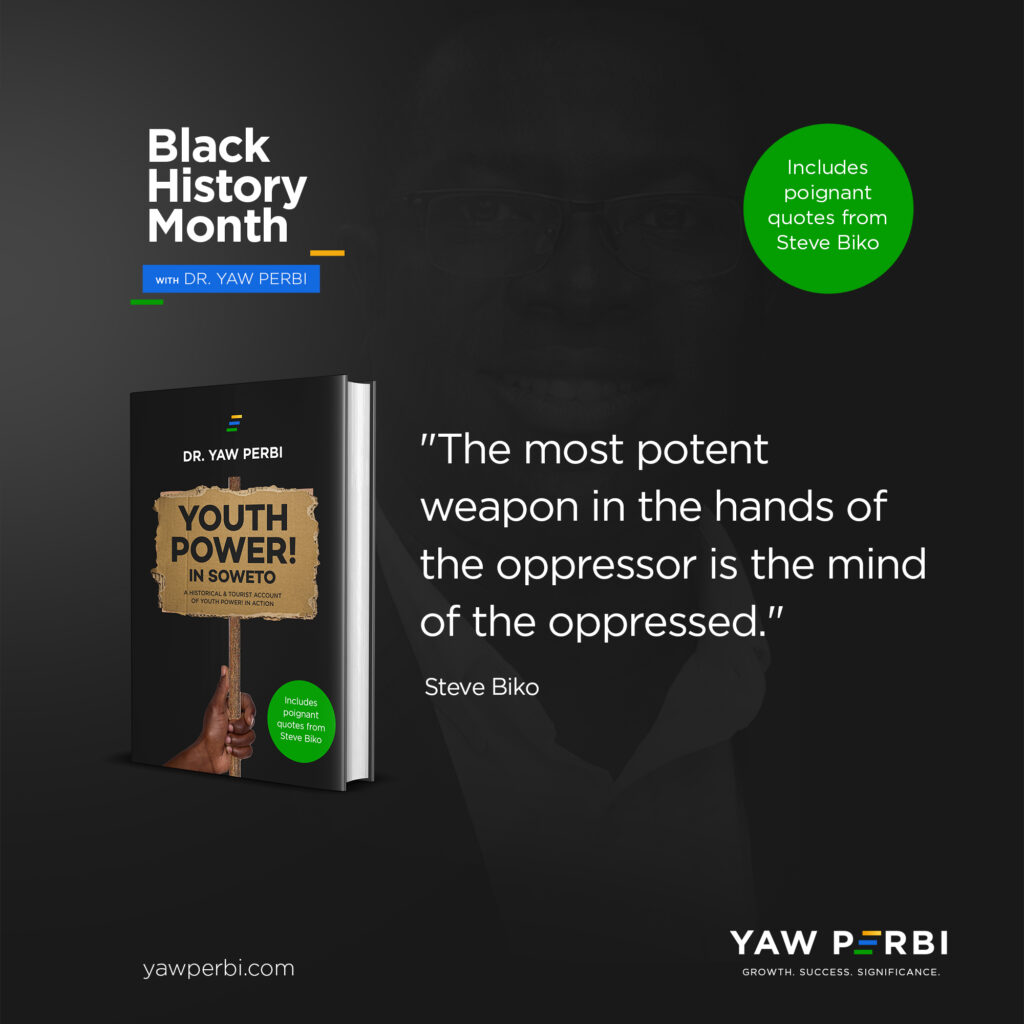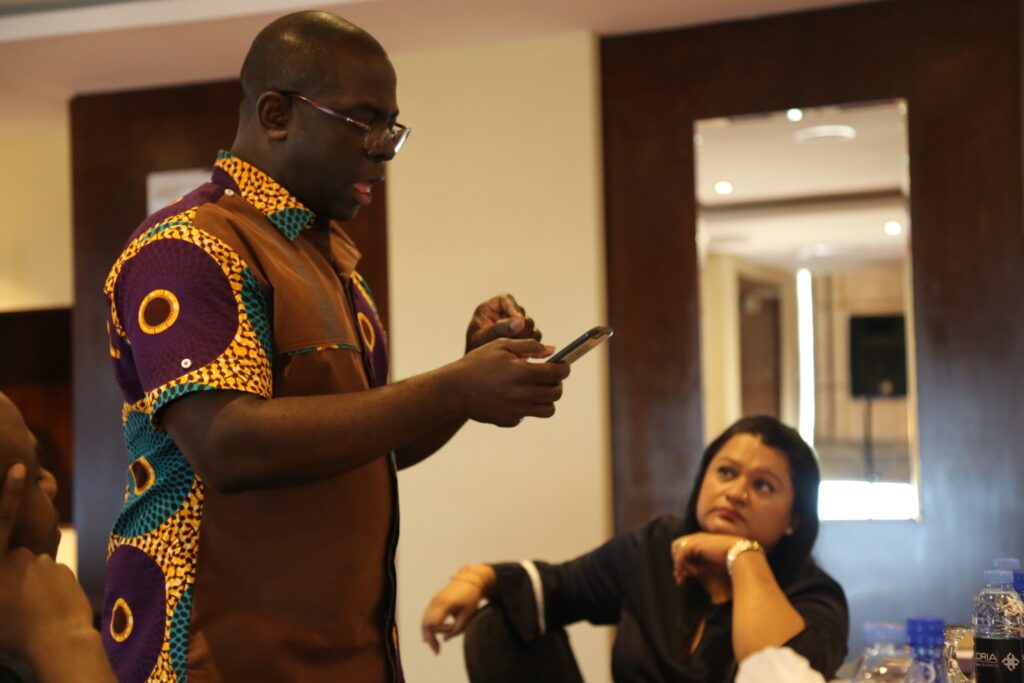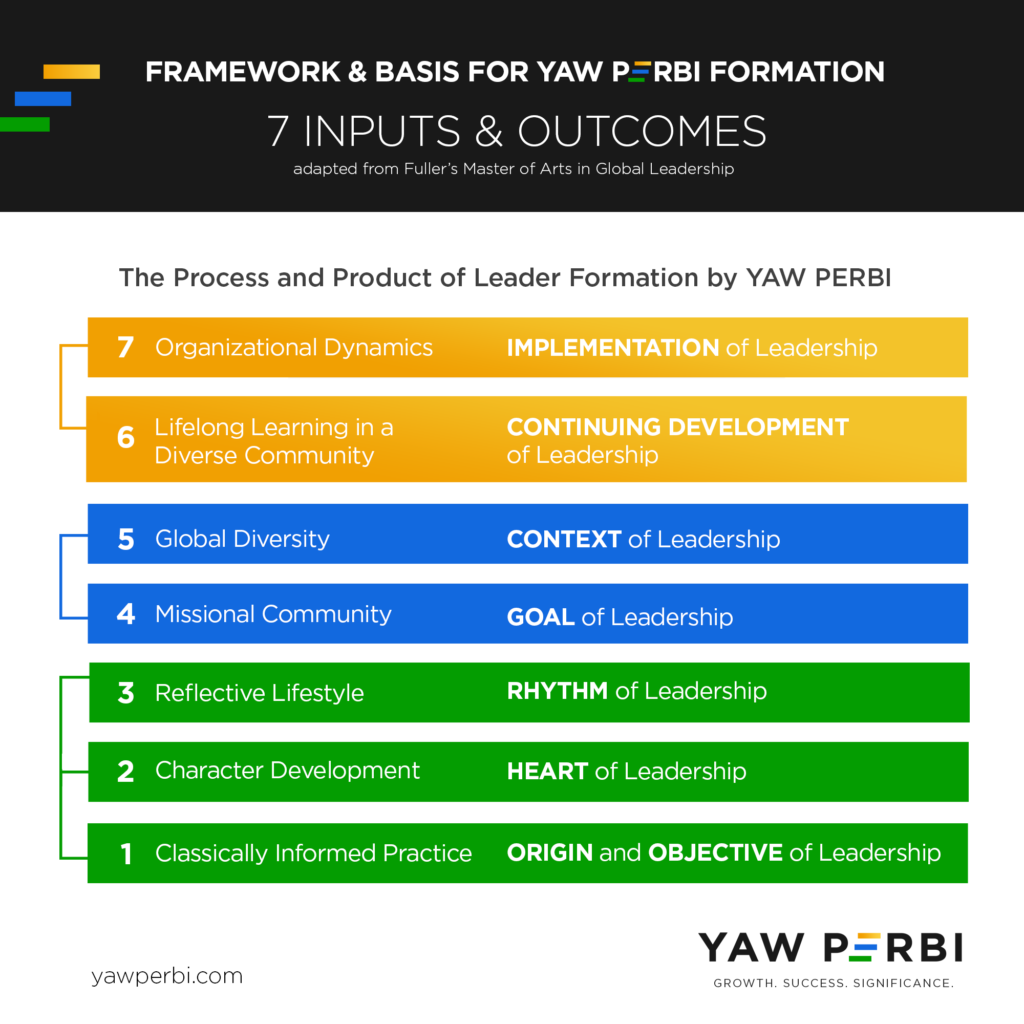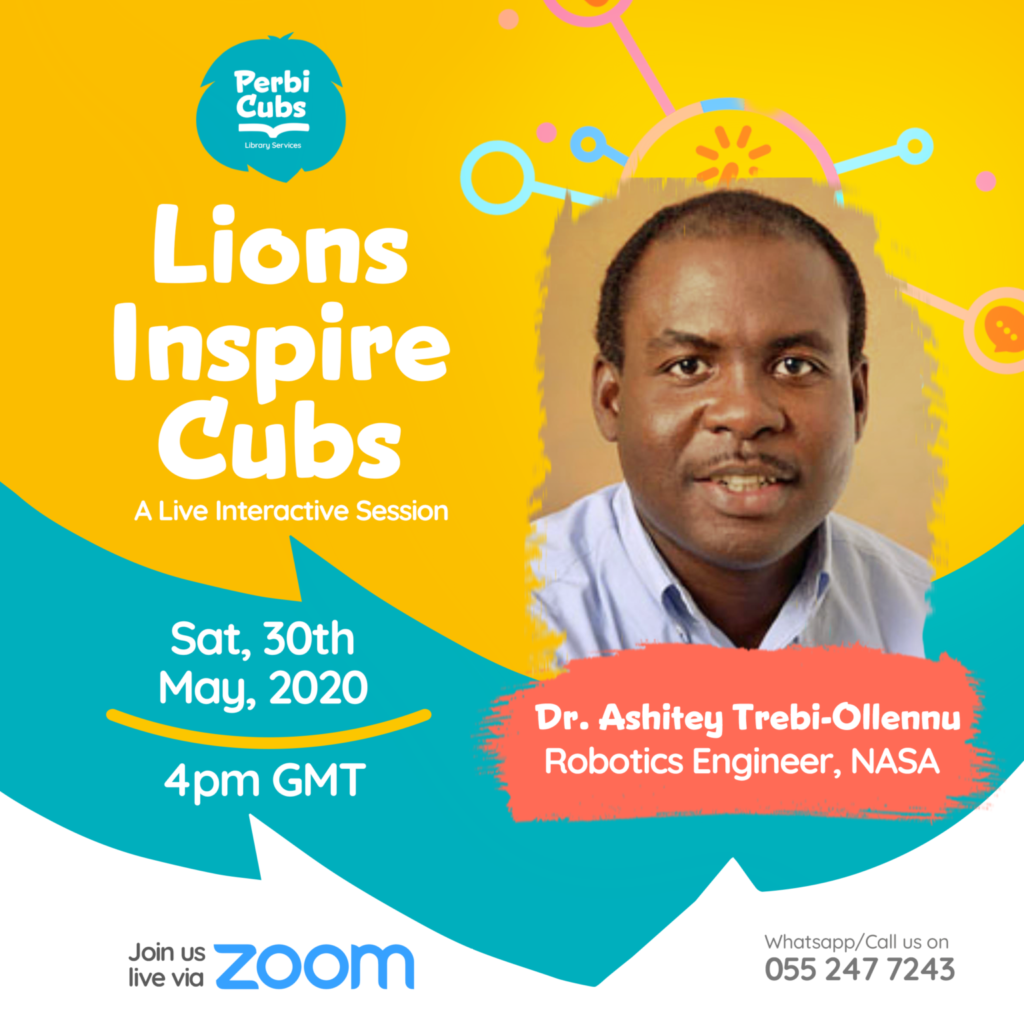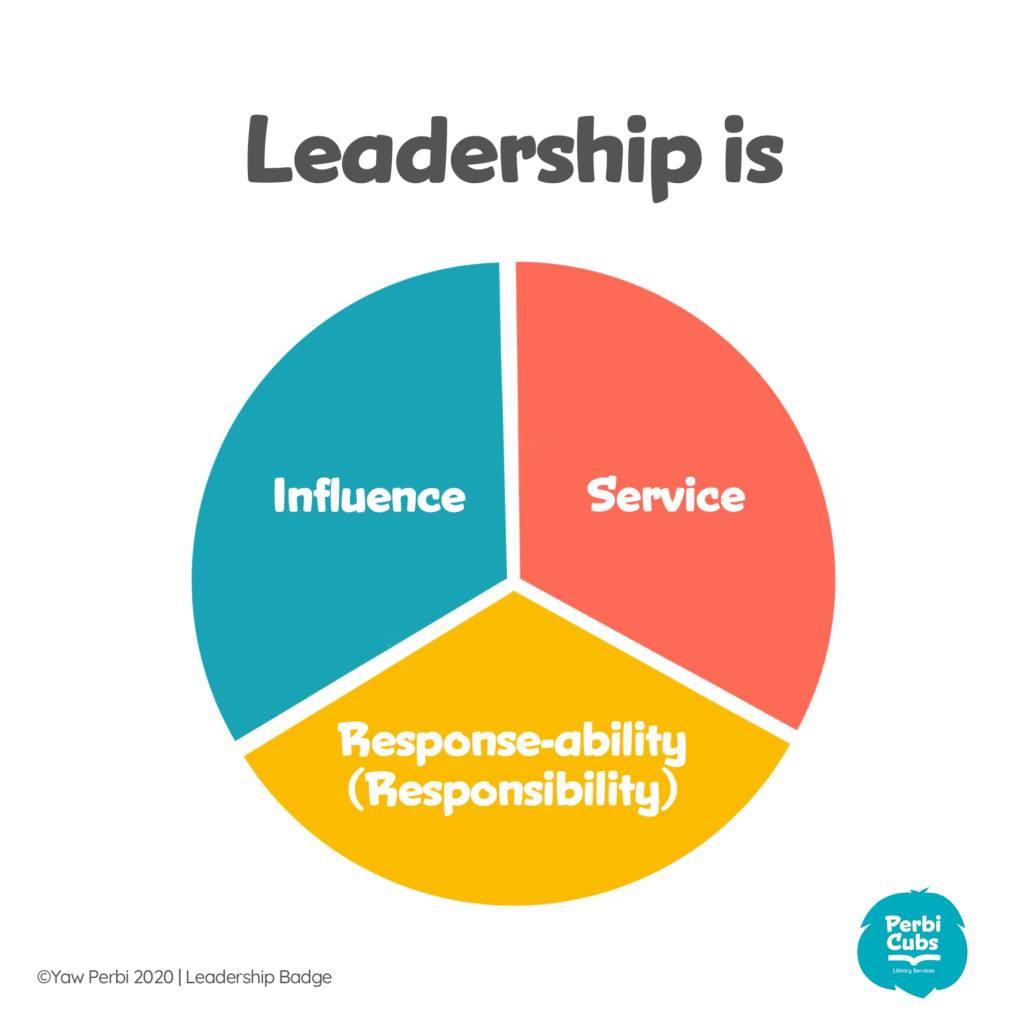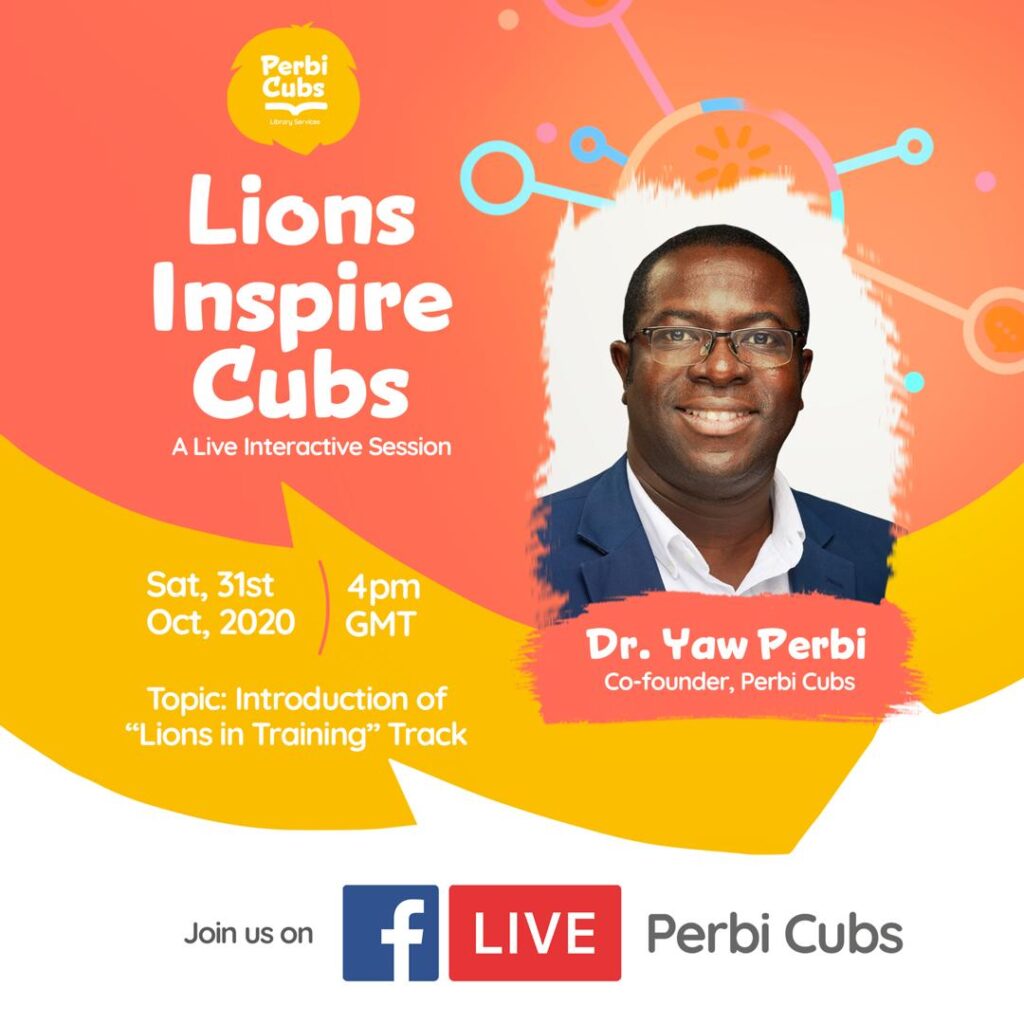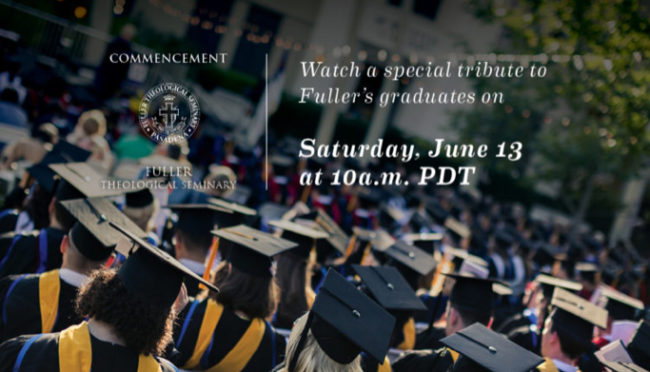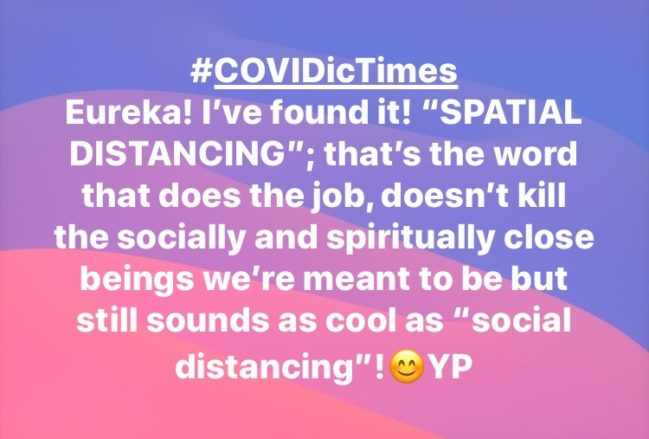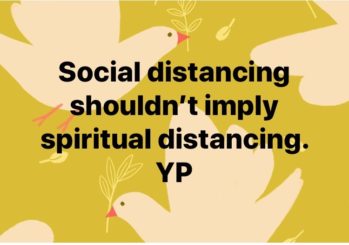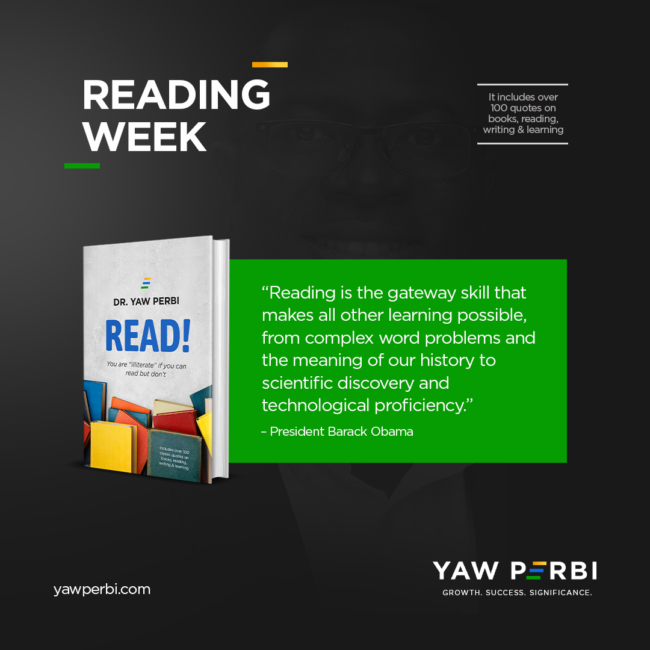
I Used Not To Like Reading. Two Statements Changed Everything.
I wouldn’t be where I am today but for books. I mean precious books like the Holy Bible (which I’ve read cover-to-cover about 10 times), Rich Dad Poor Dad (Robert Kiyosaki), The 7 Habits of Highly Effective People (Stephen Covey), The Purpose-Driven Life (Rick Warren), Before You Say I Do (Yaw Boamah), The 21 Irrefutable Laws of Leadership (John Maxwell), The E-Myth (Michael Gerber), The Prayer of Jabez (Bruce Wilkinson), Create Your Own Future (Brian Tracy), The Emotionally Healthy Leader (Peter Scazzero) etc. My life five years ago is totally different from my life now—and so was my life five years prior to that totally different—just because of the books I’ve read.
Consequently, for a decade-and-a-half now I’ve been a serious reading campaigner. Now, not only have I grown further fierce in campaigning for people to love reading, my wife and I have stepped up by stepping down. What I mean by that is, we’ve enhanced our campaign but decided to go further down to the age where humans are most pliable: childhood. And we began with our own seven children. This is the philosophy behind Perbi Cubs Library Services. You may find the story behind Perbi Cubs here.
But being a reading enthusiast, let alone champion, hasn’t always been so. I used not to like reading, at all! Then two statements hit me hard and totally shifted my paradigm, absolutely altering my way of thinking.
THE ‘RACIST’ & ‘TREMENDOUS’ STATEMENTS THAT CHANGED EVERYTHING
The first statement, I randomly encountered on the internet. I was but a youth then. As I confess in my book READ!, “I was so angry my intestines could have gushed out. If I were light skinned my face would’ve turned tomato-red instantaneously. Yet deep, very deep down my heart I knew there was a truth in this almost racist statement glaring at me from the computer screen.” This is what it said: “THE BEST WAY TO HIDE SOMETHING FROM BLACK PEOPLE IS TO PUT IT IN A BOOK!” Ah! Upsetting! Yet in many ways this is true, I’m ashamed to admit: We don’t read!
The other paradigm-knocking statement was Charlie ‘Tremendous’ Jones’ rather prophetic pronouncement: “You will be in five years where you are today except for the people you meet and the books you read.”
These two statements turned my life around to not only become a voracious reader and prolific writer, but an advocate of the same!
WHAT IS READING?
We all have read (or even still reading even right now) academic or technical texts to pass an exam or for promotion, for professional growth etc. That is not what I mean by my read campaign. When I speak of reading I mean leisure reading. Also known as “recreational reading, pleasure reading, free voluntary reading, and independent reading,” it is “independent, self-selected reading of a continuous text for a wide range of personal and social purposes. It can take place in and out of school, at any time” (International Reading Association).
Samuel Johnson shares the following sentiments: “A man ought to read just as inclination leads him; for what he reads as a task will do him little good.” I get him. Leisure reading must be voluntary and pleasurable–not just a chore–if it is to benefit us maximally.
WHY MANY ARE SCHOOLED BUT STILL “ILLITERATE”
Several of us who have learnt “ABCD…” and can practically function simply do not read. In my book READ!, first published in 2005, here’s my thesis: If you know how to read and you don’t, you are no different from the illiterate! The bottom line is the same: you both don’t read! That’s why the subtitle of the book is “You are an “illiterate” if you can read but don’t.” Many years ago Mark Twain put the same idea this way: “The man who does not read good books has no advantage over the man who cannot read them.”
CONCLUSION
If it’s any comfort to you, a guy who used not to like reading today reads several books at the same time! Even further, I’ve acquired this new habit of writing several books at the same time too! Something you need for your future to happen is hidden in a book near you. As they say at Perbi Cubs, “success is just a book away.” And it’s true. If you don’t believe Perbi Cubs or Charlie ‘T’ Jones, take it from me.
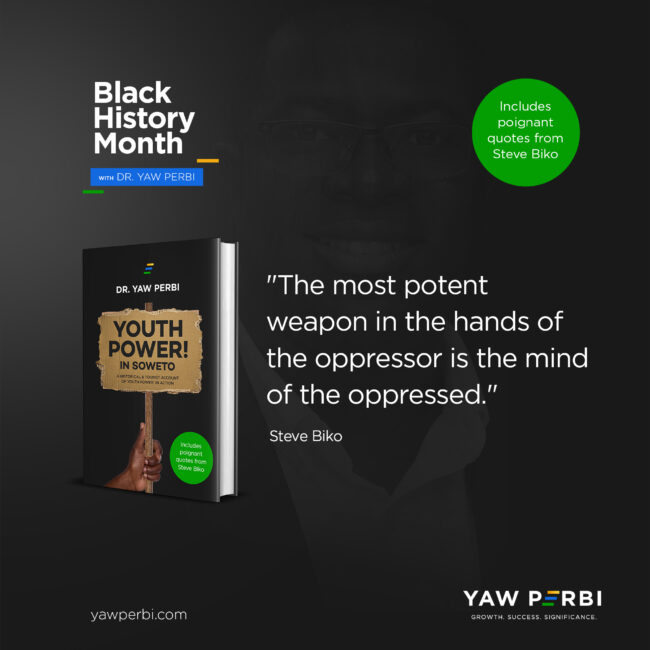
Black History Month | Why the Protests of 2020 Had a Sense Déjà Vu About Them
Here is the entire preface to the 2020 version of YouthPower! in Soweto for your enjoyment and edification. This book was first written 15 years ago upon a life-transforming visit to South Africa in 2005. The anti-racial protests in 2020 were like a 1976 déjà vu and inspired me to get this re-release going for today’s generation to remember and soldier on.
“It is better to die for an idea that will live,
than to live for an idea that will die.”
Steve Biko
The Definition of Black Consciousness, I Write What I Like, 1978
It is 2020. The pandemic year. The epochal events of this year, on both sides of the Atlantic, have had such significant parallels with the youth uprisings and protests in apartheid South Africa in 1976 that after procrastinating the republishing of this book for years I finally got the umph to do it.
“Police brutality.” “Systematic racism.” “Peaceful protests turned violent.” “We are dealing here not with a spontaneous outburst but with a deliberate attempt to bring about polarisation between whites and blacks.” “This government will not be intimidated and instructions have been given to maintain law and order at all costs.” Do any of these phrases and sentences sound familiar? Yet these are not from 2020; these are all 1976 words and phrases!
With the world slowed down, even locked down, we all had the time and bandwidth to take in the slow slaughter of an American young man, George Floyd, by those paid “to serve and protect” him. The aftermath of #BlackLivesMatter protests in the United States and around the world seemed like a coordinated tsunami. Perhaps no other year has there been more concerted protests against police brutality, systematic racism and no-nonsense towards anything or anyone glorifying an apartheid, segregationist, slavery or colonial past.
At a point, the confluence of 400th year anniversary of the first slave setting foot in America, a plague (COVID-19) and protests by the oppressed made me wonder if this was not a modern replay of the biblical Exodus, the liberation of Israel from Egypt.
Then just when things seemed to be settling down, #endSARS happened. Nigerian youth wouldn’t take the brutalization of their kith and kin anymore either. The well-organized air war (via social media) and on-the-ground protests did result in the dissolution of the notorious Special Anti-Robbery Squad (SARS) that had been unleashing untold mayhem on the Nigerian people, especially youth, for years. Some paid the ultimate price for daring to express their Youth Power! May they rest in peace. May their death bring life.
In all the standing up to, shouting out and marching against, the core demographic has of course been Young People. Youth Power! at work again; just as in 1976. In fact, my favourite picture of the 2020 protests in the U.S. so strongly correlates with a scene from 1976 although both events are seas and decades apart. On the streets of America in 2020 the youth held placards that read, “We are not our ancestors. We will fuck you up.” In Soweto, 44 years earlier, the youth had asserted similarly, “Our parents are prepared to suffer under the white man’s rule. They have been living for years under these laws and they have become immune to them. But we strongly refuse to swallow an education that is designed to make us slaves in the country of our birth.”
It seems to me that like the Boomer generation of 1976, the Millennial, Gen Y and Gen Z generations alive and kicking in 2020 have also taken seriously their mandate to leave the world better than they found it. “You see things; and you say “Why?” But I dream things that never were; and I say “Why not?”” [said a certain wise man]. I believe that was the Youth Power! mindset in 1976, replayed in 2020. Here’s to celebrating Youth Power! from Soweto to Minneapolis to Lagos to the ends of the earth.
POST SCRIPT
I am humbled by my very rich family history of Black story-telling. My grandfather, J.H. Kwabena Nketia, was an emeritus professor of ethnomusicology whose lifework was dedicated to documenting the songs and drum language of African peoples while my mother, Akosua Adoma Perbi, is a professor of history with a specialization in the slave trade, indigenous and trans-Atlantic. It seems my turn has come to continue a family tradition.
I can understand those in my generation who feel Black people are too yesterday-focused and are pushing for this month to be Black Future Month instead of Black History Month. A word of caution though: we must know our history well–although not dwell in the past–if we are to be and do today what will make our tomorrow better than yesterday. As a wise man once said, “Those who do not learn history are doomed to repeat it.” 2020 has proven that history tends to repeat itself.

Balanced Leadership Diet
Pease porridge hot, pease porridge cold,
Pease porridge in the pot, nine days old;
Some like it hot, some like it cold,
Some like it in the pot, nine days old.
That ‘Pease Porridge’ Mother Goose nursery rhyme is a succinct summary of the biases, tendencies, idiosyncrasies and preferences we all have such that without a certain degree of intentionality we might never do one thing or the other at all because it simply isn’t my thing.
In my medical school days, I found it über interesting that each specialist professor would talk about their field with such passion and all-importance as if the whole body were an eye or liver or skin or heart or bones or whatever. No matter the medical condition, they would find a cause or effect related to their darling body part. In fact, we believed there were consultants who could literally hear and spot diagnose a heart murmur without a stethoscope just by walking into the consulting room!
In leader formation, I have also found that depending on the trainer or coach’s personal preferences, biases or sweet spot, they zoom in on one area (eg. character development or strategy or organizational culture) to the detriment of other equally important aspects of leader formation.
During my Master of Arts in Global Leadership at Fuller, I encountered a schema for the programme which I fell in love with. I have since adapted it as ‘7 Inputs & Outcomes of Leader Formation’ at YAW PERBI, providing a framework and basis, process and end product for our leader formation, whether via coaching or consulting, in our authoring of resources, and certainly in our speaking and training. Here it is (diagram below).
THE SEVEN LEADERSHIP FOOD GROUPS
Your body needs a nutritional balance of carbohydrates and proteins, fats/oils, minerals and vitamins. This is accomplished through food groups like grains, milk products, meats, fruits and vegetables. Similarly, your head, heart and hands require these seven ‘food groups’ to nourish and form the basis of leader development:
1. Classically Informed Practice: This is the origin and objective of leadership. Classical means ancient. Fuller’s original is Biblically-informed for obvious reasons but while that is true for us at YAW PERBI, we also include Ancient African, Asian and Greek/Latin literature (Aristotle, Socrates, Plato). The point of rooting leader formation in a meta narrative is that many people consider the whole area of leadership/leadership development as a creation of Western business schools and or even the modern American management industry but no. The art and science of leadership dates back 6,000 years in scripture, and with the likes of Akhenaten, King of Egypt (1380-1334 BC), Moses (1391-1271 BC), Lao Tzu (604-531), Cyrus the Great (600-530BC), Confucius (551-479 BC), Plato (427-347 B), Aristotle (384-322 BC) and Cicero (106-43 BC) throughout history.
2. Character Development: Constitutes the heart of leadership. At the end of the day, the heart of the matter is the matter of the heart. As I’ve heard it said time and again, charisma without character is a disaster waiting to happen. Invariably it does. That character is the bedrock of authentic and long-lasting leadership cannot be overemphasized.
3. Reflective Lifestyle: Herein lies the rhythm of leadership. This isn’t one of Fuller’s original six. I included it after a meeting with a group of senior leaders mentoring emerging leaders in Africa. Dr. Joshua Bogunjoku, my senior medical colleague and big brother who is the international director for SIM really passionately brought the necessity for stillness, silence, introspection and such to the fore to which I agreed and couched this indispensable ingredient.
4. Missional Community: This is the goal of leadership. Leadership is about serving and influencing a group of people (community) towards a certain noble purpose (cause). That cause or mission, according to my worldview, is a subset of a meta narrative known as the missio Dei that must ultimately bring glory to the God of the universe, benefit creation (people being chief among creation) and vanquish evil. Without a flourishing community on this vital three-fold mission, what the heck is leadership for?
5. Global Diversity: It goes without saying that we live in a global village, made even tighter still by the meta internet connectivity in this Covid-19 era. Not even spatial distancing can change the closeness. It is not uncommon for leaders today to have team members strewn across different timezones and having worldview, cultural beliefs and ethnic values that are very different. Global diversity is the context of leadership today.
6. Lifelong Learning in a Diverse Community: Herein lies the continuing development of leadership. As you already know, the present continues learning of a leader gives them the right and means to keep leading. The day we stop learning, we stop leading. Lifelong learning is catalyzed in diverse community, physical or virtual.
7. Organizational Dynamics: This is how leadership is implemented. I once met a former Fortune 500 company CEO near Chicago who described companies as ‘a necessary evil.’ At the end of the day, as long as two or more people come together, we need some sort of ‘organization’ to make things happen. It’s wonderful to have a great heart, but without the cutting edge knowledge and skillful hands to steer organizations with all their dynamics, these great ideas and causes won’t last very long.
CONCLUSION
For the last decade I have believed in and practiced going deep with leaders rather than merely going wide (mass production). I believe in Maxwell’s Law of Process, that leadership is built daily; not in day. Consequently, whoever walks long enough with us at YAW PERBI will invariably realize that they have been well-fed and well-formed holistically, with each of the above seven leadership food groups amply supplied, digested and fleshed out.

How to Eat an Elephant
“The world has entered an era of the most profound and challenging change in human history. Most of our children are not prepared, and we know it. Parents around the world see the change and know that the traditional three R’s–reading, writing, and arithmetic–are necessary; but not enough. Their children need to become far more responsible, creative, and tolerant of differences. They need to increase their ability to think for themselves, take initiative, get along with others, and solve problems. Business leaders are not finding people whose skills and character match the demands of today’s global economy, including strong communication, teamwork, analytical, technology, and organizational skills. They need young people who are self-motivated, creative, and have a strong work ethic. How will we bridge this ever-widening gap?” (Leader in Me blurb)
In my previous blog, I highlighted the current global leadership crisis epitomized by the likes of U.S. president Donald Trump. Yet even over a decade ago, leadership gurus like Stephen R. Covey (of The 7 Habits of Highly Effective People fame) uttered the above words, speaking of an era of challenge our children are unprepared for. The present leadership crisis has been brewing for a long time. If we do nothing about it, we’ll be setting our world back generations, and for generations to come. So how in the world are we going about it, growing leaders from childhood? I’m glad you asked.
THE ROLE OF LIT
Perbi Cubs Library Service through their book collection, activities and Lions Inspire Cubs programs inspire and empower children to be ready for leadership and impact. The Lions Inspire Cubs program has featured Lions (Leaders making impact in society) like Dr. Ahitey Trebi-Ollenu, a Robotics engineer at NASA.
The final element of this attempt at raising young, holistic leaders is the newly-launched Lions in Training (LIT) track which results in medallion awards for Cubs. As a firm, YAW PERBI is working with Perbi Cubs from the grassroots with children at home and in school. We consult for Perbi Cubs, providing the theoretical basis and praxiological framework, breaking down high level leadership concepts into small bits to deliver leadership development to 7-14 year-olds. After all as huge as it is, even an elephant can be eat. But how do you eat an elephant? Bit by bit.
ROLE OF PARENTS IN LIT
I have often said that, “Charity begins at home, so does leadership.” Parents are not only the primary caregivers of children but their primary leadership coaches as well. Of a truth, “the hand that rocks the cradle rules the world.” So together with parents, every quarter we focus on three core areas that when gotten right will have a significant change/impact in the lives and leadership of these Cubs. Every Thursday, parents receive an email to evaluate how the child did that week as leader. These three core areas of evaluation focus on various everyday practical actions and inactions of the Cubs at home and in school.
LEADERSHIP BADGE
So after digesting tonnes of leadership articles and books and studying global leadership even at the graduate level, I have come to the conclusion that although there are over 360 documented definitions of leadership, leadership is basically responsibility, service and influence. The easiest way for a child to understand a ‘big word’ like responsiblity is response-ability.
This diagram (above) may seem simple but it is one of those things referred to as simplicity at the far end of complexity. It looks deceptively simple but has come through after a lot of complex thinking processes.
ON YOUR MARKS…
So for this quarter, this is how the children are being observed, encouraged and evaluated as Leaders in Training (LIT) in practical terms:
A. Responsibility is response-ability:
- Cub chooses to do the right thing without prompting.
- Cub is able to take charge of getting their school work done.
- Cub does not blame others for their circumstances.
B. Service is being of use to others:
- Cub is helpful at home and school.
- Cub willingly does their chores.
- Cub does not boss other people around.
- Cub uses their talents/gifts to help others or make their lives better.
C. Influence is producing effects on others:
- Cub exerts positive peer pressure.
- Cub affects the actions, behavior or opinions of siblings and friends in a good way.
- Cub sounds convincing in expressing their opinion.
CUBS CAN EAT ELEPHANTS
“So how do you eat an elephant?” my father would ask our little selves when we were just waist-high and get us head-scratching. If such a complex phenomenon like photosynthesis can be taught at the PhD level but also broken down so simply and taught at nursery (pun intended), then leadership can too. So even lion cubs can eat elephants. How? Little by little, bit by bit, one bite at a time.
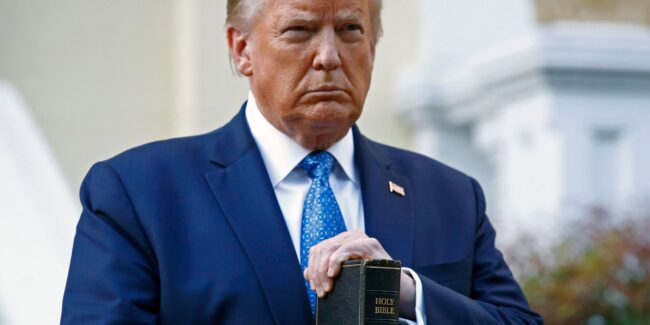
His Hair and Our Beards: Trump, a Global Leadership Crisis and our Children
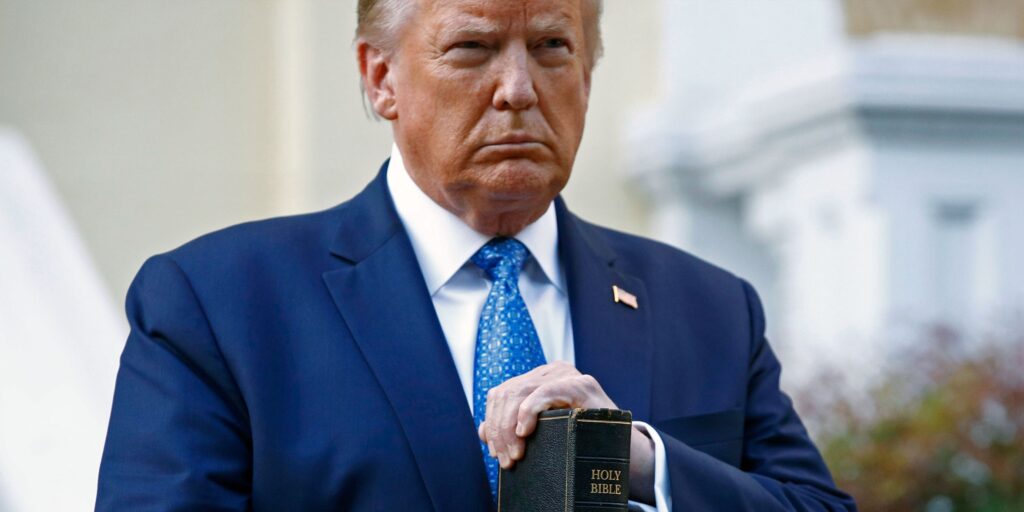
President Trump propping up a book that could flip his life and leadership if he would read and apply it. Same is true for us all! (Photo credit: The New Yorker)
“Stopping Trump is a short-term solution. The long-term solution, and it will be more difficult, is fixing the educational system that has created so many people ignorant enough to vote for Trump.” (Andy Borowitz, a satirist)
Let me begin with a disclaimer: I do not subscribe to the notion that everyone who voted for Trump is ignorant. That would be an unfair characterization. Politics is more nuanced than that. I say there are at least 3 Ps that go into one’s choice, none of which is perfect in any political party and hardly are all three aligned with what is Biblical: the PERSON (as in flag bearer), the PARTY and the POLICIES.
Having said that, how did the most powerful nation in the world end up with such a leadership crisis? I’m not just talking about the nail-biting U.S. electoral college vote count last week and the current situation where a winner has been projected but the incumbent hasn’t gathered what it takes to concede and congratulate. I speak of four years ago when America had to choose between two wannabe leaders of the free world both of whom the electorate had serious reservations about! America was caught between the red devil and the deep blue sea.
And the last four years have portrayed nearly everything I’ve been taught that leadership is NOT exhibited by the man in the White House. Is it competence in inspiring confidence about the Coronavirus pandemic and quenching it or a character of what is good and right and true or care and respect for ‘the other’? Competence, character and care constitute the DNA of leadership. Of course Trump did do some good things. I have even admired his non-political-correctness and tough skin in forging ahead buoyed by the courage of his convictions (no matter how misinformed I think they might be sometimes). By and large, however, I have had to repeatedly tell my children too many things about Trump that leadership is NOT.
THE VAN JONES MOMENT
When I saw Van Jones weep on television that as a parent the defeat of Trump and the elevation of Biden is a testament to the fact that character matters in life and leadership, I very much identified with that. Character matters. Truth matters. Decency matters. And one would think the white evangelical church in America would know better than a journalist.
If the one country that has produced the most world-impacting heads of states, Nobel laureates (390 of them; the UK which is next is at 135), stellar entertainers and astounding professional athletes could face such a gaping leadership crisis then the rest of the world had better watch out. In my Twi language from Ghana, there is a saying that when you see your neighbor’s beard on fire, you had better quickly fetch a bucket of water and place it beside yours (well, hopefully after you’ve helped him doust his!)
OF SHITTY STORIES & SHIT HOLE COUNTRIES
The S word is one that isn’t in my vocabulary. Permit me to get into the gutters in this little stretch so we both appreciate the abyss leadership sunk into these last four years. When Trump was elected I was hopeful. My family’s explanation to a United States border agent that we were crossing over from Canada to upstate New York to check on our investment property had been described by this kid in the border cage as “Such a Shitty Story.” When I wrote about that in January 2017, I was hopeful that a Trump presidency would catalyze the noble dreams Martin Luther King Jnr. had for his four little children (and my six) and not turn into the nightmare many feared. The latter has happened. Blacks still can’t breathe in 2020, George Floyd’s slow slaughter being the epitome of that.
As one born and raised in Africa I have long experienced firsthand that “everything rises and falls on leadership.” Whether as a young medical doctor in Ghana seeing patients die who shouldn’t have or as a United Nations peacekeeping soldier in Cote d’Ivoire beholding with my own naked eyes the ravages of war, there is no other one word that summarizes all that’s wrong with my continent as ‘leadership.’ The sad socioeconomic state in the midst of abundance earned us the disparaging title of “Shit hole countries” by President Donald Trump who ironically has gone ahead to look, sound and act in the very manner people who have misled, unled, disled Africa have.
START EARLY
Leadership is a sacred trust. Twenty years ago I was so concerned that leadership knowledge and mindset, character and skills be acquired early that I co-founded The HuD Group to intervene at the youth level and change the African narrative. Nearly 20 years later I am still convinced that leadership development and training must start early but even earlier: with children. And it begins by calling them “cubs” who will grow into lions and not “kids” who will grow into billy goats gruff (or the trolls in that fairy tale, for that matter LOL).
While at my executive education company that bears my name, YAW PERBI, we’re intervening at the C-Level, Perbi Cubs Library Services is beginning from the very roots: with children and from our homes and schools. I’ll tell you why we launched the Lions In Training (LIT) Track at Perbi Cubs only a couple of weeks ago (although we’ve been dreaming about this for a long long time).
WHY LIT?
LIT is the collective attempt of Perbi Cubs and parents who are preparing the next generation to meet the great challenges and opportunities of the twenty-first century and thrive! The LIT track is to help groom our Cubs into holistic Leaders (Lions). The Perbi Cubs reading community knows that the future of our reading Cubs is promising because of the world of opportunities opened to them every day as they open books to read. For sure, readers are leaders.
Reading, however, is necessary but not sufficient.In this light, Perbi Cubs desires to partner parents to nurture Cubs in relevant soft skills that will take them places and form them into young well-rounded leaders of great impact. Research shows that a leader is developed over the entire course of their life: from womb to tomb. It is never too late to start teaching, learning and applying leadership skills to everyday life.
Next, I’ll show you HOW we’re going about it. For now remember, Trump’s orange hair is on fire; we all had better get a bucketload of godly, effectual leadership to sit by our beards!
*NB: YAW PERBI serves as consultant, coach and trainer for Perbi Cubs and is not involved in the day to day management of this groundbreaking social enterprise. If you require YAW PERBI’s assistance in executive coaching, management consulting or leadership training reach out to yawperbi@gmail.com.
COVIDic Times: One of the Best Gifts Ever!
So I just came on sabbatical. The best gift of week 1 was sleep–day time sleep! It was good for the body, really good. Then the next week came and its gift really took care of my soul. I got re-connected with my teenage friends from around the world, from every continent! Many of them I had lost touch with for 24 years!

With my 50 friends from 50 different countries in front of the national museum in Taipei, Taiwan. The year was 1996.
THE END FROM THE BEGINNING
I started life backwards. Sort of. Usually people fool around in their teens and when they are all grown up–mature (whatever that means), prim, proper, and seasoned–become ambassadors of their countries. I became an ambassador for Ghana in my late teens, a youth ambassador, together with 50 other World Vision Youth Ambassadors from 50 different countries! As a strapping 18-year old, that experience would irreversibly enlarge my heart; and it has never been able to shrink back into being merely Akan or just Ghanaian or even only African. Never. I’ve been a global citizen since the mid-90s, or a ‘world class Christian’ as my mentor Paul Borthwick would put it, and yet at the time I did not even yet quite understand how much God is a global God on a mission, as I do today.
Connecting the dots, it might no longer come as a surprise then that a couple of decades later I’ve been to 45 countries and lived for a year or more in three, worked with the United Nations, founded and expanded The HuD Group to two dozen countries on each continent, pastored an English-speaking Chinese church in a French city (Montreal) in North America (Canada) and spent my last seven years as president of International Student Ministries Canada, empowering international students to impact the world through Jesus Christ. WVYA was my second experience as an international student, the first being as an exchange student from Achimota School in Accra to Ballard High School in Louisville (Kentucky, USA), the year prior. Being a World Vision Youth Ambassador in 1996 is a gift that keeps giving, like this last couple of weeks!
THE CHANG CHALLENGE
How I got selected as the World Vision Youth Ambassador for Ghana was a miracle, divine. I will leave that story for another time, lest I digress. WVYA was a phenomenal idea birthed by Dr. Jerry Chang, then World Vision Taiwan CEO to bring together 50 young people from 50 different countries to pursue and promote life’s common grounds, universal values. We would study conflict prevention, justice, peace, unity, reconciliation etc. and embody all of this as we constitute a choir travelling the world with this message of unity in diversity. For six weeks this group would live together as global community doing all the philosophical as well as musical studies, and then for the next six weeks tour Taiwan (the host) and other countries. 1995 was the debut year. In my year, we got to tour Taiwan, the USA (New York, Washington DC, Los Angeles, Seattle), Mexico and Canada. The 1997 cohort’s countries were Taiwan, Japan, USA and Guatemala (I got to do that tour too, as I’ll explain shortly below). In all, the programme run for five years–1995, 1996, 1997, 1998, 1999 and with a combined finale of selected previous ambassadors in 2000–resulting in 245 youth ambassadors from 61 countries in total.
THROW BACK
A couple of weeks ago I was contacted by Claudia Sofia, who was the ’96 Colombia Ambassador in my cohort, that the 1997 year group was planning an online reunion and had requested her and me to co-facilitate. She, together with a few of them, did such a splendid preparatory job that I didn’t have much to take care of, really. The thing about Claudia and I is that we were the two out of our group of 51 in 1996 who were selected by the WVYA staff and invited back as staff interns for the following year’s programme so we are very familiar with both 1996ers and 1997ers. Claudia and I reunited about eight years ago when her family temporarily relocated to Canada where I’ve been living and serving with my family since 2009. We have not only been in touch since but have for the last five years worked together on leader development globally and in Latin America in particular through The HuD Group.
It was amazing seeing all these WVYA ’97ers on the Sunday July 5 call; and the cherry on top was the presence of Mama Chang, the 94-year old matriarch, wife of WVYA founder. Inspired by the 1997 gathering, Claudia and I got to work on a WhatsApp group to rally the 51 youth ambassadors of 1996. To cut a long story short, in the last two weeks not only have we found (with CIA, Interpol and Scotland Yard skills) 48 of the 51 Youth Ambassadors and corralled everyone into the same WhatsApp group we have also held two online Zoom reunions (July 11 and July 18), affording everyone to reminisce the past, provide a current update and begin a conversation about re-imagining the future. At the time of writing this, all the other year groups have already met except 1995 (in the offing).

A sample of our classic pre-concert posters. We were famous across Taiwan; then New York City, Washington DC, Mexico City (Mexico), Los Angeles (USA), Seattle (USA), and Vancouver (Canada).
WHY NOW? PANDEMIC BLESSING
The various year groups have had mini reunions here and there over the last two decades; and even in 2015 I was privileged to be part of a cross-cohort mini reunion in Prague but never have we been able to gather this many people together all at once. What’s the difference? COVID-19!! As Rodrigo (Mexico) and Li-Hoon (Singapore) put it bluntly during the first 96ers reunion call: “THANK YOU COVID!”
So why and how come this significant reunion at such a time as this? In the first place, we’re all no longer busy bigwigs criss-crossing the planet about our all-important affairs. We have every one’s attention and no one’s going anywhere. Secondly, the lockdown’s making many of us begin to feel lonely; we are seeking community, even if it’s online. Thirdly, COVID-19 and its ramifications is making us more contemplative and asking what really matters in life. We’ve been glad to pick up memories and rekindle friendships we inadvertently dropped. Fourthly, this pandemic has changed the way we think! Hitherto, we would’ve been seriously planning a ‘big’ physical reunion with all the limitations of time, air travel expense, visa drama, hosting logistics etc. How come it’s never occurred to us in 24 years to hold an ONLINE REUNION?! How hard is that?! But it just wasn’t in our mental framework. And don’t forget, in 1996 when we were teenagers and formed these relationships, smart phones didn’t exist and the internet and email had barely become available to us commoners. Our brains may have only associated each other with snail mail and a fine opportunity for stamp collection.
But the last reason may be the most important of all. The world has turned pretty ugly in the last little while with bigotry, racism and a certain brand of unrestrained nationalism. All of these have been heightened during this pandemic, coming to a head with the unjust death of George Floyd and the mass protests that it sparked all over the world on every continent, calling for racial equality and justice. As I mentioned on the WVYA ’97ers call, it seems to me that although we all knew our mission of peace, love, reconciliation and unity in the world was important back in the 1990s (after all my sweetheart Duda, for instance, took solace in playing piano among the bombs blasting in the Bosnian war), I still feel Papa Chang had so much vision that WVYA rather is an idea whose time has now come, 25 years later.
It was at WVYA that I learnt not only in song that “we teach the young our difference but look how we’re the same” but lived that reality among 50 other nationals for three months. My conclusion as a (maybe precocious) teenager was: we have much more in common than we are different. In fact, it wasn’t until about six weeks into the programme that the thought first even crossed my mind: I am Black. It hadn’t mattered. At all.
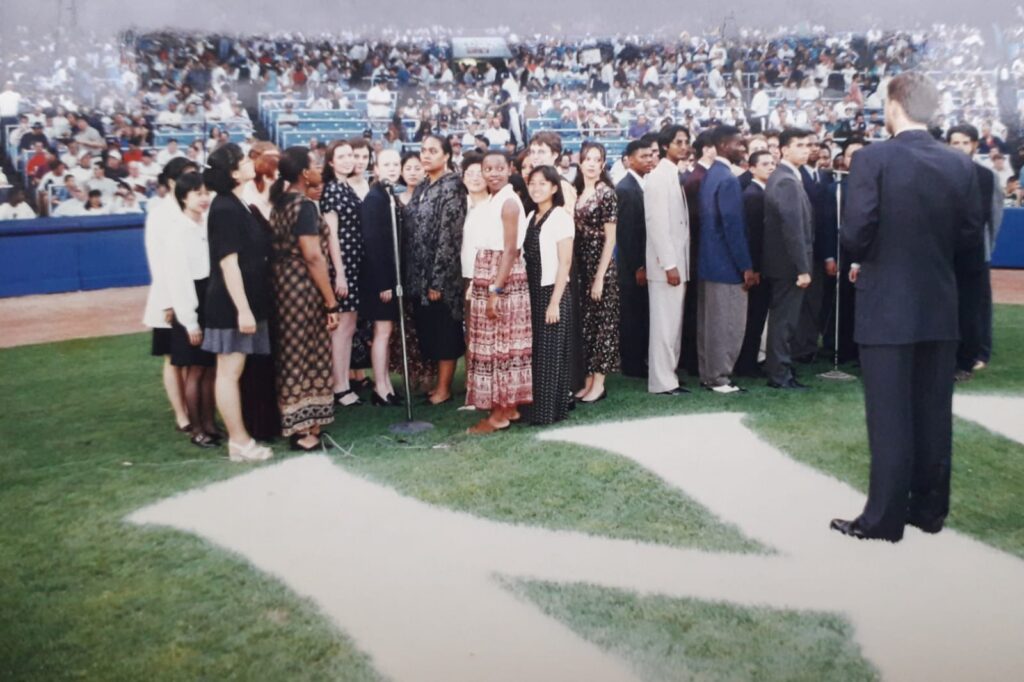
We got to sing the American national anthem at the start of a New York Yankees game. Danny Devito threw the first pitch.
BACK TO THE FUTURE
Danish philosopher Soren Kierkegaard aptly said, “Life can only be understood backwards, but it must be lived forwards.” As I reconnect (in order of recent rediscovery and rallying onto WhatsApp) with Claudia (Colombia), Tom (Uganda/currently domiciled in England), Isobel (Ireland/France), Nayunda (Zambia), Carolina (Hong Kong/UK), Li Hoon (Singapore), Ivyn my roommate (Sri Lanka), Henrietta (Zimbabwe/USA), Isariya (Thailand), Esther (New Zealand), Panha (Cambodia), Ginger (USA), Jeffrey (Costa Rica), Nashipai (Kenya), Joyce (Lebanon/Canada), Wilge (Bolivia/USA), Greg (Taiwan), Lara (Canada/USA), Nino (Georgia), Haime (Philippines), Nelson (Papua New Guinea), Duda (Bosnia & Herzegovina), Yayoi (Japan), Janneke (Netherlands), Arnold (Honduras/Mozambique), Anielka (Nicaragua/USA), Rodrigo (Mexico), Mirjam (Germany), Carlos (Ecuador/USA), Derese (Ethiopia/USA), Sinara (Dominican Republic/Bulgaria), Ariel (Chile), Luis (Guatemala), Pamela (India), Cornel (Romania/Canada), Annie (Malawi), Fikile (Swaziland/South Africa), Pierrick (Switzerland), Young Suk (South Korea), Simon (Bangladesh/Canada), Mpho (Botswana), Davi (Brazil/Uruguay), Romed (Tanzania), Ghassan (Palestine), Angelina (Russia), and Rytha (DR Congo), I’m also connecting the dots.

A Zoom screenshot of half of us staff and ’96 ambassadors on the first reunion call on July 11, 2020. This is the kind of image of equality and togetherness that the world ought to be seeing much much of.
I believe Bobby Clinton was right, that “God develops a leader over the entire course of their lives” and He sure lays down “sovereign foundations,” like WVYA, for His purposes in each of us in every generation. I could never have chosen this life, but I love it! More importantly, I love the One who did and all these nationals He has brought my way! Again, my heart expanded and has never been able to shrink back since.
Guess who else was right? Papa Chang. Today we are the wives and husbands, fathers and mothers, professors, CEOs, homemakers, celebrated performers (choral, gospel, jazz, opera), members of parliament, government ministers etc. of change, “doing our little thing in our little corners” as Mama Chang exhorted on the July 11 call. But guess what? Now that COVID-19 has brought all these little embers together, who knows what worldwide bonfire may start. World, watch out! for as Victor Hugo once remarked: “You can resist an invading army; you cannot resist an idea whose time has come.”
COVIDic Times: My Addiction to D.V.
Those who know me well will tell you I have an addiction to D.V.; no, not T.V., D.V. And it’s the smartest ones who ask me, sometimes after an unsatisfactory Googling spree: “what does ‘DV’ mean?” Let me spill the beans today.
Today is not as I had planned it. Some six months ago, Anyele and I had imagined a family road trip across the North America continent (we’ve done it once), from where we live in Montreal, Quebec (East Coast) all the way to Pasadena, California (West Coast). Yes, the trip in itself would be enjoyable but the icing on the cake would be today, my graduation from Fuller Seminary with a Master of Arts in Global Leadership. Unless you are a stranger on the planet, there’s no need to tell you why we’re stuck at home in Montreal (incidentally the Coronavirus epicentre in Canada), watching my Commencement from a laptop screen instead!
I’m not complaining; just telling my version of a story almost everyone of us can relate to. Whose ‘solid’ plans haven’t changed this year due to a certain ‘invisible’ Coronavirus? Most of us had the year quite well-laid out and then… BAM! COVID-19 hit. Tell me: how are your new year plans going?
D.V., THE WISDOM OF JAMES
It is a well-functioning human being that recognizes it is a good thing to plan one’s life, year, month, day etc. It is also a well-functioning Homo sapiens that recognizes it is human to have limits–we cannot, and do not, control everything. We get to make some things happen under our control but some things also happen to us beyond our control–like the season, the weather. We are only human (ouch, why does that hurt so much?!). God is Omnipotent (all powerful); we are mini potent. God is Omniscient (all knowing); we are mini scient (how much is your science?). God is omnipresent (present everywhere at the same time, including the future); we are mono present and can only live in the now.
Besides, God is eternal, everlasting, but not so with us–we each have an ‘expiry date.’ God is God; we are not. (S)He has no limits; we do. My mentor Peter Scazzero is spot on that “embracing our limits humbles us like little else.” In fact, the word for human in my Twi language is Odasani, literally meaning, one whose days finish. James the brother of Jesus Christ exhorts then:
13 Now listen, you who say, “Today or tomorrow we will go to this or that city, spend a year there, carry on business and make money.” 14 Why, you do not even know what will happen tomorrow. What is your life? You are a mist that appears for a little while and then vanishes. 15 Instead, you ought to say, “If it is the Lord’s will, we will live and do this or that.” 16 As it is, you boast in your arrogant schemes. All such boasting is evil. 17 If anyone, then, knows the good they ought to do and doesn’t do it, it is sin for them. (James 4:13-17, emphasis mine)
D.V. then isn’t Digital Video, Domestic Violence, Daily Value, Double Vagina, Dependent Variable, Diversity Immigrant Visa (DV lottery) or … whatever else people find when they Google it after I send their minds reeling with those two alphabets at the end of my email, SMS or social media sentences? D.V. is Deo Volente, Latin for “God willing” or “if it is the Lord’s will” as St. James lays it out so beautifully in the aforementioned Scripture.
In my few years on the planet I must say that I have found my Muslim friends take the spirit and practice of Yakubu’s Scripture above much more seriously than my Christian brothers and sisters. The former often are quick to add to their futuristic statements and plans, “Insha Allah,” God willing.
HOW I GOT HOOKED
By now you’ve probably heard me tell the story of how God miraculously saved my life during this fatal car accident (picture above) on 21st July, 2008 on the Yamoussoukro-Abidjan highway in Cote d’Ivoire while serving with the United Nations Operation there. What you most likely don’t know is that I clearly bouncing up and down in my military boots as I enthusiastically went to our Radio Room at our base in Bouaké (about the middle of the country) that crisp morning and confidently said to the operator on duty in Ga (the language of the people of Accra; my wife Anyele’s tribe), the equivalent of: “We are off to Abidjan. We will be back.”
No. “What is your life? You are a mist that appears for a little while and then vanishes. Instead, you ought to say, “If it is the Lord’s will…”I’m getting goosebumps even right now recalling my shock the moment I realized that out of the three of us who left our U.N. hospital base that morning, two of us never returned as they died in the said car crush en route to Abidjan and even I did not come back the same man who left.
Since then, I have become an extreme addict to ‘D.V.’, humbly attaching it to virtually every futuristic statement and plan I make, sometimes to the chagrin of others who haven’t died like me before. For me it isn’t only the right thing to do because Scripture says so; I’ve experienced the wisdom and reality of it several times, the epitome being July 21, 2008. To me then, to not add ‘D.V.’ to my plans is sin (James 4:17).
EVEN ROYALS ARE NOT EXEMPT
Arthur W. Pink tells a D.V. story from his perspective in his book, The Sovereignty of God, something that occurred twenty years prior:
“Queen Victoria was dead, and the date for the coronation of her eldest son, Edward, had been set for April 1902. In all the announcements which were sent out, two little letters were omitted, D. V.-Deo Volente: God willing. Plans were made and all arrangements completed for the most imposing celebrations that England had ever witnessed. Kings and emperors from all parts of the earth had received invitations to attend the royal ceremony. The Princes proclamations were printed and displayed, but, so far as the writer is aware, the letters D. V. were not found on a single one of them. A most imposing program had been arranged, and the late Queen’s eldest son was to be crowned Edward the Seventh at Westminster Abbey at a certain hour on a fixed day. And then God intervened, and all mans plans were frustrated. A still small voice was heard to say, “You have reckoned without Me,” and Prince Edward was stricken down with appendicitis, and his coronation postponed for months!”
A NOTE TO ONE WHOSE DAYS FINISH
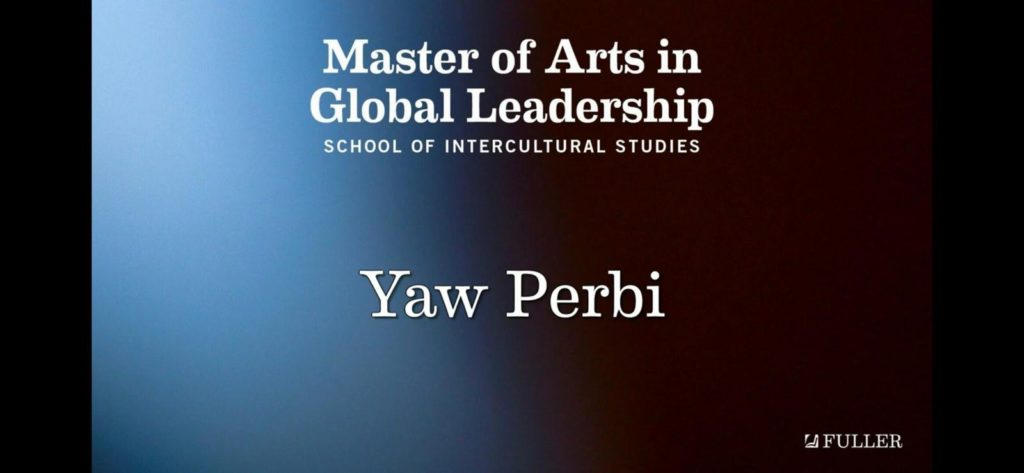
All I got was a screenshot; not walking across the stage as I had envisioned, let alone driving across the continent!
The point is not that God is some Supreme Heavenly Killjoy, eagerly looking out for whose parade He can rain on today or tomorrow but rather that we accept we are only human and humbly add ‘D.V.‘ to our plans, great or small, as long as they extend beyond this very second. Deo Volente. “Why, you do not even know what will happen tomorrow. What is your life? You are a mist that appears for a little while and then vanishes.” My days haven’t ended (yet) but my Commencement plans surely have.
Why Being an ‘African Christian’ isn’t an Oxymoron.
A friend and old school mate asked an ‘innocent question’ on Face Book: “Why is African Traditional Religion confused with wizardry or witchcraft?” Some of the responses I saw got my missiological juices going!
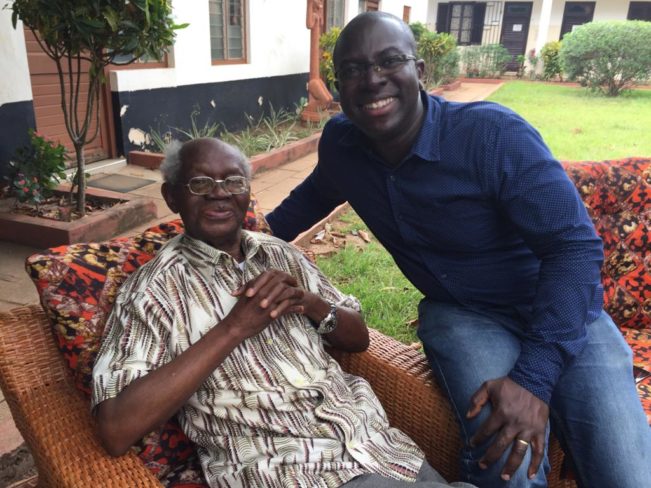
Hanging out with my late grandfather, Emeritus Prof. J.H. Kwabena Nketia, at the African Studies department garden at the University of Ghana
My grandfather, who was so well-eulogized in The New York Times when he passed away last year (March 2019), was so African that some people wondered how on earth he could be Christian! Even I used to wonder, with his close proximity to traditional folklore and hunter songs, familiarity with traditional palace protocols, committed transcription of Akan drum language and such. It was hard for me to decouple African traditions from ancestral and demonic worship. Being born and bred Evangelical, in my conversations with him I tried to figure out whether he actually had a personal relationship with Jesus Christ. Was he truly born again?
In the last couple of years as I’ve taken courses at the Akrofi-Christaller Institute for Theology Mission & Culture I have come to appreciate his way of being African and Christian, which the current rector of the institute, during his Evening of Remembrance sermon (see pg. 39) at the Great Hall of the University of Ghana, said that Grandpa epitomized. In fact, Prof. B.Y. Quarshie entitled his sermonette from Galatians 3:1-9 as “Fully African, Fully Christian.” After all, Prof. Nketia was the founding chancellor of Akrofi-Christaller, an accredited postgraduate degree-awarding institution, and continued for a decade, till he was about 95 years old. In his scholarly work in ethnomusicology I did not realize Grandpa was directly touching on missiology, documenting the different sights and sounds of the very “great multitude that no one could count, from every nation, tribe, people and language” that John the Revelator had a vision of, “standing before the throne and before the Lamb” (Revelation 7:9). “The music of Africa, like its language, is, so to speak, ‘ethnic-bound.’ Each society practices its own variant,” Grandpa said. Alas, this African Christian was doing holy work! As one colleague put it, and reported in The New York Times, “He showed that the African history of music was a sacred tradition revealed.”
1. THE GOSPEL CHALLENGES EVERY CULTURE
So back to Eliza’s question: “Why is African Traditional Religion confused with wizardry or witchcraft?” Good question! My first instinctive answer was, “There’s a thin line; that may be why.” Every culture has what is great about it (there are features/fingerprints of God all over) but also what is broken since Eden. Idolatry is one consequence of that brokenness, whether African, Mesopotamian or European culture. It’s actually hard to beat the many gods the Greeks and Romans (Europeans, remember?) had. Paul speaks to this issue not in an idol-ridden African village but at the Areopagus, in the heart of Greece as he gives his ‘TED Talk’:
So Paul, standing before the council, addressed them as follows: “Men of Athens, I notice that you are very religious in every way, for as I was walking along I saw your many shrines. And one of your altars had this inscription on it: ‘To an Unknown God.’ This God, whom you worship without knowing, is the one I’m telling you about. He is the God who made the world and everything in it. Since he is Lord of heaven and earth, he doesn’t live in man-made temples, and human hands can’t serve his needs—for he has no needs. He himself gives life and breath to everything, and he satisfies every need. From one man he created all the nations throughout the whole earth. He decided beforehand when they should rise and fall, and he determined their boundaries. His purpose was for the nations to seek after God and perhaps feel their way toward him and find him—though he is not far from any one of us. For in him we live and move and exist. As some of your own poets have said, ‘We are his offspring.’ And since this is true, we shouldn’t think of God as an idol designed by craftsmen from gold or silver or stone. God overlooked people’s ignorance about these things in earlier times, but now he commands everyone everywhere to repent of their sins and turn to him. For he has set a day for judging the world with justice by the man he has appointed, and he proved to everyone who this is by raising him from the dead” (Acts 17:22-31, NLT, emphasis mine).
The past is forgiven. God is now calling and commanding “everyone everywhere” to have a change of mind (repent) and turn towards him (convert)! All peoples, everywhere! Africans aren’t the only ones who have been called to turn away from idols to the one true God. All have sinned and fall short of the glory of God (Romans 3:23); all are in need of redemption. “All” means all including all, excluding none.
2. THE GOSPEL CHANGES EVERY CULTURE (BUT IS ALSO SHAPED BY IT)
As a missiologist, I was surprised how in the said Face Book discussion little credence was being given to the fact that the Gospel of Jesus Christ is for every nation, people group (ethnos), tribe and tongue. Do people just not know that or do they intentionally suppress that truth?
So while the Gospel challenges and changes every culture it is also remarkably shaped by every culture! Kenyan theologian John S. Mbiti said it best: “Christianity is always a beggar seeking food and drink, cover and shelter from the cultures and times it encounters in its never-ending journeys and wonderings.” True, some Westerners knowingly or ignorantly tried to Westernize (ostensibly ‘civilize’) our African peoples and that’s a shame (a very human thing to do—to believe what we have is best and others must conform) just as some early Christians wanted to make Jews out of Gentiles (by making circumcision a necessity) before they could be accepted into Christ.
It is a real shame that Christianity and Colonialism came from the same vessel. This generation’s got to separate the grain from the chaff. If you are an African Christian you’ve got to decolonize your faith in Jesus Christ. ‘African Christian’ is not an oxymoron. On the contrary it is the ultimate fulfilment of everything African. My Christianity must make me more African, not less, otherwise I’ve missed something really basic about the Gospel.
As a fellow Achimotan, I mentioned to Eliza she had to marvel at how the founders expertly maneuvered the tension between what’s good in our African cultures and needed to be upheld and what has to be discarded (including witchcraft) because of God’s revelation in Christ. They therefore wanted an institution whose ideals were “the belief on which all else rest, in Jesus Christ as the revelation of all time and all people, of the love of God, and as the guide and pattern for our lives” and simultaneously one where there was “respect for all that is true and lasting value in the old African culture, beliefs and ways of life.”
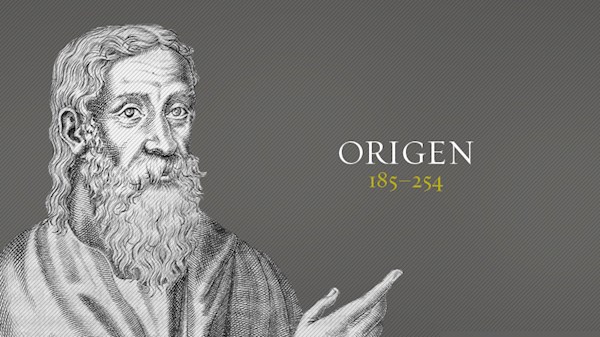
An example of an African Christian who shaped European (and global) Christianity before the advent of European missions to Africa and colonialism a millennium-and-a-half later
3. DECOLONIZING THE GOSPEL STORY
Every African Christian must own a copy of and read Oden’s ‘How Africa Shaped the Christian Mind.’ Early African Christians (as early as the 30s and 40s A.D.) and later on into the second to fifth centuries literally shaped Western Christianity before the latter turned round 1,500 years later to bring us a Gospel that was in Western garbs and made to look as if Jesus was ‘Made in the West.’ Know your history so that no one robs you of your salvation in Jesus Christ, which is for all people–every nation, tribe and tongue.
Even newer than Oden’s work is Bantu’s “A Multitude of All Peoples: Engaging Ancient Christianity’s Global Identity” (2020). In it he asserts how “Christianity is not becoming a global religion. It has always been a global religion. The early Christian movement spread from Jerusalem in every direction, taking on local cultural expression all around the ancient world.” And asks, “So why do so many people see Christianity as a primarily Western, white religion?”
When people, out of arrogance or ignorance, tell Africans like me that “Christianity is the white man’s religion”, I laugh on many levels: anthropological, historical, missiological, scriptural, theological… I wish I had the time to chase all those assertions and their originators. The fact that I do not always respond should not be misconstrued as I have no cogent answers.
Even without going into the MANY Scriptural references to Africa(ns), I can think of African Christians in the last 2,000 years who have shaped Christianity like Athenesius, Anthony of Egypt, St. Augustine (from Algeria), Justin, Clement, Origen (picture above) etc. In fact, even the term ‘Trinity’ was coined by an African called as Tertullian (from Tunisia). He is the same guy who gave us the designations of Old and New testaments.
Origen, for example, “was incomparably the greatest scholar and theologian of the Eastern Church in the early centuries as well as a prolific writer. His learning and his works were encyclopaedic. He is reputed to have written about 6,000 books. The first scientific theologian, Origen was a man ahead of his age, particularly in terms of Biblical scholarship and criticism” (Dictionary of African Christian Biography). Make the time to visit the Dictionary of African Christian Biography, and be inspired by the stories of ancients through martyrs and missionaries to nationalists. ALL AFRICAN.
TIME TO COOL OFF WITH A SIP OF GLORIOUS PALM WINE
I like how intelligent contemporary Africans are asking intelligent questions about culture and faith. May it go with an attendant desire to learn proper history and with discernment to extract the pure Gospel from its various cultural entrapments. The Gospel of Jesus Christ is good news for ALL people–EVERY nation, tribe and tongue!
COVIDic Times: SPATIAL DISTANCING; NOT SOCIAL.
We all know what is meant by the most popular phrase in the universe right now, ‘social distancing,’ but the term is unacceptable to me on at least three levels. I would rather go for the term ‘spatial distancing’ than ‘social distancing,’ and here’s why.
The world is in wartime mode, fighting a pandemic that hasn’t spared any country or territory on the globe and so this is not the moment to be squabbling over words. But for what it’s worth let me get this ‘social’ versus ‘spatial’ debate off my chest!
The COVID-19 formula to contain the pandemic locally and to ‘flatten the curve’ globally has mainly been hand washing (or sanitizing), masking up (depending on who you listen to) and ‘social distancing.’ The latter has meant anything from being six feet away from your neighbour to simply staying at home.
While the mode of transmission of the SARS-CoV-2 virus calls for such a physical distancing from one another in order not to contract the disease or infect others (if you already have it) my problem with the term ‘social distancing’ is three-fold.
1. THE SOCIOLOGICAL FAUX PAS
First of all, we are social beings. We all know ‘No man is an island,’ a popular quote from the English metaphysical poet John Donne (1572-1631). Distancing ourselves from one another at anytime has harmful consequences let alone at such a time as this. My friends on Face Book and I, knowing what was meant by ‘social distancing’ yet unhappy with what it connotes, began this discussion a couple of weeks ago and tried to find another term. We initially landed on ‘physical distancing’ which is as clear as day yet doesn’t have the same ring to it as ‘social distancing.’ As succinctly put by Nana Efua, “‘social distancing’ sounds more hip.” Theo Aryee even went ahead to take screenshots of dictionary definitions of physical (“relating to the body as opposed to the mind”/”involving bodily contact or activity”) and social (“relating to society or its organization”/”needing companionship and therefore be suited to living in communities”) for comparison online.
Some don’t mind the term ‘social distancing’; it’s no big deal to them. As Esi put it, “I personally don’t see the fuss… When in SOCIAL contexts, (as in, when with other human beings), keep your distance. “Same Difference”, and since the memo has been circulated already, we might as well not muddy the waters.” I was pleased to read in the Los Angeles Times that those of us fussing on Face Book were not alone. In an article entitled “Isolation is hazardous to your health. The term ‘social distancing’ doesn’t help,” the staff writer refers to a professor at Northeastern University in Boston, Daniel Aldrich, who says, “The moment I heard public health authorities use the term, I thought they were making a mistake.” I was pleased to read that his preference, like my friends and I, was “physical distancing.”
“Aldrich fears the phrase “social distancing” suggests we should be turning inward and closing ourselves off from friends and neighbors in the outside world.” I concur. He hits the nail right on the head: “That’s the exact opposite of what we want people to do. You need to have as close social ties as possible when physical distancing is in effect.” As a medical doctor I know social connections affect many socioeconomic and health indicators and from Aldrich’s own post-disaster studies, actually directly affect death rates.
2. THE ANTHROPOLOGICAL FAUX PAS
I find the anti ‘social distancing’ reaction of experts from a generally individualistic Western society intriguing as anthropologically, they are more likely to come up with a term like that. For the West, especially since the Enlightenment with its “I think therefore I am” movement, autonomy and individualism are rife. As someone born and raised in the global south, where to be is to be in community, I would say if ‘social distancing’ sounds bad to a Westerner then it’s anathema to the Majority World.
For the Global North, generally, I am because I think; for the rest, I am because we are. The South African Bantu term Ubuntu, to wit “I am because you are,” encapsulates the idea that humans cannot exist in isolation. There is no personhood without the other and we depend on community connection, conversation and caring. For honor-shame cultures, which two-thirds of the world is, social distancing is synonymous with having a cause for shame. If you consider Archbishop Desmond Tutu’s definition of ubuntu in his 1999 book you will see how it’s the exact opposite of ‘social distancing’: “A person with Ubuntu is open and available to others, affirming of others, does not feel threatened that others are able and good, based from a proper self-assurance that comes from knowing that he or she belongs in a greater whole and is diminished when others are humiliated or diminished, when others are tortured or oppressed.”
3. THE THEOLOGICAL FAUX PAS
Finally as a Christ-follower, and a pastor at that, I always try to theologically reflect on the words, terms and concepts I use. ‘Social distancing’ (again while we all know what is meant) wouldn’t cut it theologically. The nature of the Triune God—one-in-three, three-in-one—of the Christian faith, as argued by Tertullian (c.155-220 A.D.) of Tunisia, is that “from all eternity God is one, but God is not alone.” Right from Genesis 1:1, Elohim (the Hebrew word for God) is a plural noun, most explicitly seen in Genesis 1:26 where God says, “Let us make humanity in our image, according to our likeness.” As another theologian put it, “at the centre of the universe is a relationship.” At the centre of the universe is a community: Father, Son and Holy Spirit.
Since this article is not an apologetic for the Trinity, suffice it to say that mankind having been made in the image and likeness of the Triune God who is himself relationship, family, community and social, cannot be ‘socially distant’ and remain human. In the above March 18, 2020 Facebook post I wanted to sound a caution, especially since churches were at the cusp of being forced to close for physical meetings, that the last thing anyone should do at this time is to lose not only the horizontal relationship with each other (as explained in the first two points above) but also the vertical relationship with God as well. God’s family, the ‘household of faith,’ is not referred to as ‘the body of Christ’ for nothing. There can be no social or spiritual distancing of any of the body parts.
CONCLUSION
So it was with utmost excitement on the eve of April Fool’s day that I posted the following on my Face Book wall (which has suffered a lot of graffiti since the COVID-19 broke out): “Eureka! I’ve found it! “SPACIAL DISTANCING”; that’s the word that does the job, doesn’t kill the socially and spiritually close beings we’re meant to be but still sounds as cool as “social distancing”!”
I’m on a personal campaign to kill ‘social distancing’ and replace it with ‘spacial distancing.’ Human beings can afford to be physically distant for a season but die in more ways than one when we become socially and spiritually distant, even for a brief moment. Off to keep up the fight with clean hands against the Coronavirus; spacial distancing it is while at it. Selah.
A Painful Thought
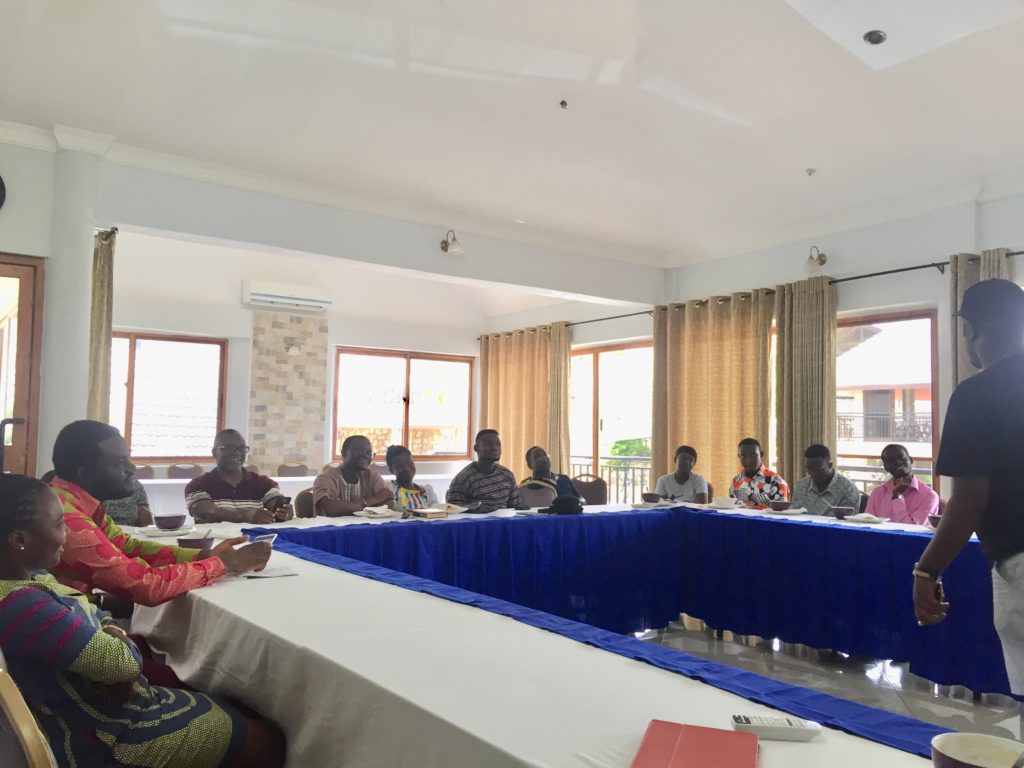
Andragogy (adult learning) and Pedagogy (teaching children) are miles apart
When I attended the University of Ghana Medical School (UGMS) I always thought the posture of most of my lecturers and professors was not only authoritative but even rather condescending. Now I know why. We were not exactly ‘kids;’ in fact, some of us were even married and such, and yet one of Knowles’ six core adult learning principles (Knowles 2015, 6)—prior experience of the learner—was being violated again and again.
Contrary to Lindeman’s foundation that “the resource of highest value in adult education is the learner’s experience” and that “experience is the adult learner’s living textbook” (20) we were rather treated as neophytes with not only nothing in our heads but nothing in our hands to offer either. I have been wondering whether any of the designers of our curriculum knew, considering their ‘sage on stage’ approach and ultimate ‘punishment’ of examinations that “authoritative teaching, examinations which preclude original thinking, rigid pedagogical formulae—all these have no place in adult education” (20).
Considering how deeply wounded my medical education experience has left me, and now understanding why from the principle of “prior experience of the learner” being violated, I resolve never to treat any adult learner the way I felt mistreated in my future design of educational programmes.
Taking the advice of Lindeman, this principle implies that in programme and/or lesson design “none but the humble become good teachers of adults” (21). It is a beautiful thing to see the experience of the adult learner esteemed so highly, even at par with the teacher’s knowledge! “In an adult class the student’s experience counts for as much as the teacher’s knowledge. Both are exchangeable at par. Indeed, in some of the best adult classes it is sometimes difficult to discover who is learning most, the teacher or the students” (21-22). Wow!
Reference
Knowles, Malcolm, et al. 2015. The Adult Learner: The Definitive Classic in Adult Education and Human Resource Development. San Francisco: Jossey-Bass.

